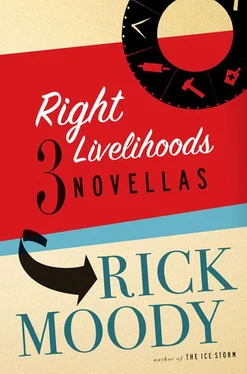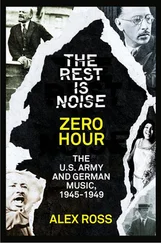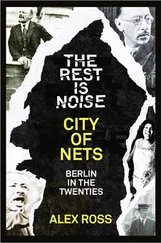This is my scoop, then. The scoop is that suddenly I saw what she was seeing.
Cassandra said, “Watch this.”
Pay close attention. I saw a close-up, in my head I saw it, like from some Web movie — a guy’s arm, a man’s arm, an arm covered with scars, almost furry it was so hairy, and then a hand pulling tight a belt around a biceps, jamming in a needle, depressing the plunger, a grunt of initial discomfort. Then the voice of the guy, thick accent, maybe a Dominican accent, announcing his threat: “I’m going back to the Lower East Side and I’m going to cap the motherfucker, see if I don’t.” Definite speech impediment. A problem with sibilance. You know? Then this guy, this dude, was looking over at Cassandra — she was in the scene, not in the elevator, where we were at least theoretically standing, but with Eduardo Cortez. She was his consort. He was taking her hand, there was a connection of hands, a circular movement of hands, and then Cassandra and I were on a street, and I saw Cortez in Tompkins Square Park, which doesn’t exist anymore, of course, and it was clear that he was searching out a particular white guy, and now, coming through the crowd, here was the guy, looked like an educated man, if you know what I mean, one of those East Village art-slumming dudes. Cortez was searching out this guy, who was kinda grungy, wearing black jeans and a T-shirt, and it was all preordained, and now Cortez had found him.
Lights associated with the thrall of Cassandra’s recollection, phantom lights, auras. The particulars were like a migraine. Things were solarized; there were solar flares around the street lamps. We were bustling in and around the homeless army of Tompkins Square. I could hear my own panicky breathing. I was in a park that didn’t exist anymore, and I was seeing Cortez, and I was seeing this guy, this white guy — he had that look where one side of his face, the right side, was different from the other side, so that on the right side he seemed to be melancholy and placid, whereas on the left there was the faintest resemblance to a smirk at all times. The left side was all contorted, and maybe there were scars there, some kind of slasher’s jagged line running from the corner of his mouth to his ear, and Cassandra, I guess, was saying, “Let’s not do this, okay? Eduardo? Please? Eduardo? We can fix the problem another way.” Except that at the same moment she was saying to me, somehow outside of this memory I have of these events, she was saying, “Do you understand what you’re seeing?”
I said, “He’s going to—”
“—Kill the guy.”
“And that guy is?”
“Addict Number One.”
“Who?”
“That guy is the first user,” she said. “The very first one.”
“And why is he important?”
Cassandra said, “For the sake of control. You don’t get it, do you?”
“Tell me,” I said.
“Addict Number One is being killed in a memory. ”
Something coursed in me like a flash flood. A real perception, maybe, or just the blunt feelings of sympathetic drug abuse. When I tried to figure out the enormity of what Cassandra was telling me, I couldn’t. I couldn’t understand the implications, couldn’t understand why she would tell me what she was telling me, because to talk was to die, as far as I could tell, because Fox was dead, Bob was dead, the Mnemonic X boys had been completely wiped out, probably fifty guys, all disappeared, same day, same time, reporters from my old paper were dead. Chasing the story of Albertine was to chase time itself, and time guarded its secrets.
“How’s that possible? That’s not possible! How are you going to kill someone in a memory? It doesn’t make any sense.”
“Right. It doesn’t make any sense, but it happened. And it could happen again.”
“But a memory isn’t a place. It’s nowhere but in someone’s head. There’s not a movie running somewhere. You can’t jump up into the screen and start messing with the action.”
“How do you know? Just watch and you’ll see.”
I was thinking, see, about the diachronous theory. The pattern of abuse and dispersal of Albertine was widest and most threatening at the instant of the murder of Addict Number One, I was guessing, which was about to be revealed as a murder — the first and only murder, I hoped, that I ever needed to witness, because even if he was a smirking guy, someone unliked or ridiculed, even if he was just a drug addict, whatever, Addict Number One was a prodigious rememberer . As the first full-scale Albertine addict, I learned later, he had catalogued loads of memories, for example, light in the West Village, which in July is perfect at sunset on odd-numbered streets in the teens and twenties. It was true. Addict Number One had learned this. If you stood on certain corners and looked west in summer, at dusk, you would see that the city of New York had sunsets that would have animated the great landscape painters. Or how about the perfect bagel? Addict Number One had sampled many of the fresh bagels of the city of New York, and he compiled notes about the best bagels, which were found at a place on University and Thirteenth Street. They were large, soft, and warm. Addict Number One devoted pages to the taste of the bagel as it went into your mouth.
Sadly, instead of illuminating the life of Addict Number One, it’s my job now to describe the pattern of the dispersal of his brains. The pattern that was exactly like the pattern of dispersal of radioactive material in lower Manhattan. Cortez held the revolver to the head of Addict Number One, whose expression of complete misunderstanding and disbelief was heartrending, enough so to prove that he had no idea what his murder meant, and Cortez pulled the trigger of the revolver, and Addict Number One fell over like he had never once been a living thing. Fucking punk-ass junkie, Cortez intoned. Were the baroque memories of Addict Number One now part of all that tissue splattered on the dog run in Tompkins Square? Was that a memory splashed on that retriever there, gunking up its fur, an electrical impulse, a bit of energy, withering in a pool of gore in a city park? I saw it because Cortez saw it, and Cortez gave the memory to Cassandra, who gave it to me: corpus callosum and basal ganglia on the dogs, on the lawn, and screaming women, the homeless army drawn up near, gazing, silent, as Addict Number One, slain by a drug dealer in memory only, weltered, gasping. His memories slain with him.
It was like this. Even though the memory was just a memory, its effect was real. As real as if it were all happening now. This is like saying that nine-tenths of the universe is invisible, I know. But just bear with me. Cortez’s accomplishment was that, according to Cassandra, he’d learned from informers that Addict Number One was once a real person, with a real past (went to NYU, and his name was Paley, and he wanted to make movies), after which he’d located a picture of Addict Number One by reading an obituary from the time after Addict Number One was already dead.
Must have been pretty tempting to try to fabricate a memory about Addict Number One. Oh yeah, I saw him on the Christopher Street pier that time. Or I saw him on my way to Hunts Point to visit my grandma. Cortez may have tried this, perhaps a dozen times, skin-popping Albertine in an unfurnished room in East Harlem, vainly attempting to put a bullet in the head of an imagined encounter with Addict Number One, but no. Cortez had to go through every face in every crowd, all the remembered crowds of which he had ever been a part, every face passed on Broadway, every prone body on the Bowery, every body in the stands of Yankee Stadium. He shot more, spent most of the money from his bike messenger job on this jones for narrative, and then one day he was certain.
Читать дальше












